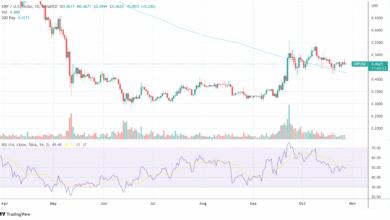Digital Euro: The Future of Payments in Europe?

The digital euro is poised to revolutionize the landscape of financial transactions in Europe, as the European Central Bank (ECB) speeds up its central bank digital currency (CBDC) project amid heated discussions among financial experts. The initiative aims to provide a comprehensive digital currency solution, challenging the dominance of foreign payment giants like PayPal and Visa, while enhancing local payment solutions for European consumers. During the recent Frankfurt Digital Finance Conference, key players in the finance sector, including Burkhard Balz and Atze Faas, expressed a clear consensus on the need for a robust and efficient digital euro. With plans to establish regulatory frameworks and select technical providers by 2025, the pursuit of a successful digital euro is seen as crucial for future economic resilience. However, lingering questions about privacy and potential risks to the banking system must be addressed to ensure widespread public acceptance and trust in this transformative digital currency.
Introducing the concept of the digital euro, Europe is on the verge of adopting a groundbreaking form of digital cash that promises to modernize payment systems across the continent. This central bank digital currency, or CBDC, aims to strengthen the European financial ecosystem by providing innovative payment solutions tailored to meet the demands of modern consumers. As discussions unfold among key stakeholders, alternatives like stablecoins also emerge, offering decentralized options for digital transactions that may enhance user experience and security. Critics highlight the need for transparency and privacy, instilling confidence among users who might be wary of a centralized digital currency. Ultimately, the challenge lies in balancing the benefits of digital currencies against the potential pitfalls, ensuring that this evolution serves the people of Europe effectively.
The Role of the European Central Bank in the Digital Euro Initiative
The European Central Bank (ECB) plays a pivotal role in shaping the future of digital currency within the Eurozone. As the institution tasked with maintaining monetary stability, the ECB’s exploration into a central bank digital currency (CBDC) like the digital euro aims to offer consumers a secure and efficient payment solution. President Christine Lagarde has emphasized the need for establishing a robust regulatory framework to guide the digital euro’s implementation by 2025, highlighting the urgency of maintaining the region’s competitive edge against global payment giants.
In the midst of rising digital finance discussions, the ECB seeks to clarify its position and interact more closely with commercial entities and the public. The push for a digital euro presents an opportunity for the ECB to redefine its relationship with both consumers and financial institutions, ensuring that the digital currency meets the needs of diverse stakeholders. This transformation is crucial if the ECB aims to foster trust and engagement with its new offering.
Understanding CBDC and Its Implications for Consumers
The concept of a Central Bank Digital Currency (CBDC) introduces a new dimension to the financial landscape, especially within Europe. The digital euro could provide consumers with unique advantages such as instantaneous transactions and lower costs when compared to traditional banking methods. Moreover, by moving towards a state-backed digital solution, consumers can experience increased security, as their transactions would be backed by the full faith of the ECB, mitigating fears related to private, less-regulated alternatives.
However, the shift towards a CBDC raises valid concerns among consumers regarding privacy and data security. As the panelists highlighted, if the digital euro compromises users’ financial anonymity by tracking every transaction, it could deter public acceptance significantly. Thus, it’s imperative for the ECB to articulate a clear and consumer-friendly narrative explaining how this digital currency will operate while safeguarding user privacy. This communication will be essential to foster approval among the public.
Revolutionizing European Payment Solutions
The emergence of the digital euro has the potential to redefine payment solutions across Europe. Presently, many consumers are reliant on American payment providers, which can be costly and often lack the seamless integration necessary for a unified digital economy. By introducing a digital euro, European consumers could benefit from a cheaper and faster alternative that encourages local transactions and fosters regional economic growth.
Beyond cost and speed, the digital euro could also empower consumers with more choices, leveling the playing field for smaller payment providers. Advocates argue that this digital payment solution should be accessible to all Europeans, not just financial institutions. This democratization of currency could drive competition, innovation, and ultimately create more value for consumers across the European economic landscape.
Navigating the Digital Euro’s Privacy Concerns
As discussions surrounding the digital euro continue, privacy concerns have surfaced prominently. The centralization of financial data associated with a CBDC could pose significant risks if not properly managed. Stakeholders, including representatives from the Bundesbank, have acknowledged that robust privacy measures will be critical to the digital euro’s success. Only by prioritizing data protection can trust be established in this new digital financial system.
Furthermore, as the digital euro develops, it is essential to balance transparency with individual rights to privacy. European consumers, already concerned about data security in the digital age, must feel assured that their financial transactions will remain confidential. A transparent approach in addressing these issues will not only reassure consumers but also establish a strong foundation for the widespread acceptance of the digital euro.
The Competition Between Digital Euro and Stablecoins
The rise of stablecoins introduces an intriguing alternative to central bank digital currencies like the digital euro. Stablecoins, particularly those regulated within the EU, could provide a decentralized approach to digital transactions while reducing reliance on traditional banking frameworks. Entrepreneurs, such as Juha Viitala, underscore the potential for these financial innovations to complement or compete with structures like the digital euro, ultimately providing more choices for consumers.
While stablecoins promise lower transaction costs and faster payment solutions, they also pose unique challenges, particularly regarding regulatory scrutiny and volatility concerns. However, their inherent flexibility could allow them to better adapt to consumer needs compared to a more rigidly governed digital euro. The outcome of the interaction between these two forms of digital currency will significantly influence the future of financial transactions in Europe.
Marketing the Digital Euro: Winning Consumer Trust
An essential factor for the successful implementation of the digital euro lies in effective marketing strategies aimed at educating consumers. Experts, including Atze Faas, point out that many potential users remain unaware of what the digital euro entails and its potential benefits. Tailored marketing efforts should focus on explaining the mechanics, security, and advantages of adopting a digital currency.
Building a compelling narrative around the digital euro is therefore paramount not only for consumer adoption but also for overcoming skepticism surrounding new technologies. By prioritizing communication that demystifies the digital euro, the ECB can alleviate concerns and foster enthusiasm, paving the way for its acceptance as a mainstream payment solution.
Consumer Education: Key to Digital Currency Acceptance
For the digital euro to be widely accepted, consumer education must be prioritized. As observed at the Frankfurt Digital Finance Conference, many individuals remain uninformed about the upcoming changes in payment solutions that the digital euro will bring. Effective educational campaigns should aim to elucidate how consumers can utilize the digital euro while highlighting its advantages over traditional payment systems.
Moreover, investing in informative resources and outreach programs can pave the way for smoother transitions to the digital euro. Individuals need reassurance that adopting this new form of currency will not only be user-friendly but also beneficial to their everyday financial transactions. By empowering the public with knowledge, the ECB can help to ensure the digital euro’s success within the Eurozone.
Future Prospects for Digital Currencies in Europe
As Europe navigates through the incorporation of digital currencies in the mainstream financial ecosystem, the prospects for the digital euro and its counterparts like stablecoins are increasingly dynamic. The ECB’s ambition to launch the digital euro may set a precedent for other central banks worldwide as they assess their strategies regarding CBDCs. The rapid evolution of digital finance calls for adaptability and collaboration between public and private sectors.
Moreover, the conversation surrounding digital currencies will likely persist as technologies advance and consumer preferences evolve. The interplay between the digital euro and private stablecoins could dictate the future landscape of European payment systems, ultimately defining how consumers engage with digital finance. Through strategic planning and innovation, the ECB and industry players can work towards a more cohesive financial environment.
Addressing Liquidity Risks in the Financial System
A key concern surrounding the implementation of a digital euro is the potential liquidity risks it may pose to commercial banks. The shift towards a centralized digital currency might disrupt the existing banking ecosystem, altering how banks manage their reserves and liquidity. These dynamics could prompt reevaluation of traditional banking models and necessitate innovative solutions to mitigate risks.
Experts recognize that addressing these liquidity challenges is crucial to maintaining financial stability in the Eurozone. Balancing the benefits of a CBDC with the potential ramifications for commercial banks will be a focus area for the ECB as they move forward with their plans. Collaborative efforts with financial institutions may be necessary to create safeguards and ensure that liquidity remains robust, preserving confidence in the financial system.
Frequently Asked Questions
What is the digital euro and how does it relate to the European Central Bank?
The digital euro is a proposed central bank digital currency (CBDC) being developed by the European Central Bank (ECB) to provide a digital payment solution for European consumers. It aims to enhance the efficiency of payment systems and reduce reliance on foreign payment providers.
How will the digital euro improve payment solutions in Europe?
The digital euro is designed to innovate payment solutions by providing users with a reliable and efficient digital currency for transactions, which could reduce transaction costs and processing times compared to traditional banking systems.
What are the potential benefits of the digital euro compared to stablecoins?
The digital euro, as a CBDC, is expected to offer advantages like faster transaction speeds and lower costs while maintaining regulatory oversight, unlike private stablecoins that may not be subject to the same level of control and are not backed by a central authority.
What concerns exist regarding privacy with the digital euro?
There are significant concerns about privacy when it comes to the digital euro. Critics point out that centralizing financial data could allow for increased surveillance of personal transactions, prompting discussions on the need for stringent data protection measures to ensure user privacy.
Will the digital euro be available to the general public or only to financial institutions?
Discussions among experts continue regarding whether the digital euro should initially be introduced as a wholesale product available to financial institutions or rolled out to the general public for retail use.
How does the European Central Bank plan to address the competition with American payment providers through the digital euro?
The ECB aims to create the digital euro as a European payment solution that directly competes with dominant American payment service providers like PayPal, Visa, and Mastercard, ultimately enhancing Europe’s economic resilience.
What is the timeline for the implementation of the digital euro?
The European Central Bank has set a significant timeline to select technical service providers and establish a regulatory framework for the digital euro by 2025, accelerating the developmental pace of the CBDC.
What role do consumers play in the acceptance of the digital euro?
Consumers are critical to the success of the digital euro; it is essential for stakeholders to effectively communicate the benefits and functions of the digital euro to enhance public understanding and acceptance.
What are the differences between the digital euro and private stablecoins?
The digital euro, as a CBDC, is fully regulated and backed by the ECB, ensuring stability and security. In contrast, private stablecoins operate independently and may lack regulatory oversight, leading to different levels of risk.
How can the European payments ecosystem benefit from cooperation around the digital euro?
Experts emphasize that cooperation among payment service providers in Europe can enhance the value and efficiency of the digital euro, promoting a unified approach to digital payments and improving consumer options.
| Key Points | Details |
|---|---|
| Background | The ECB is advancing its CBDC project for a digital euro, with plans to have a regulatory framework established by 2025. |
| Need for Digital Euro | Experts agree on the need for a European digital payment solution to reduce reliance on U.S. payment giants. |
| Role of ECB and Banks | Discussion on the digital euro’s availability being either wholesale (to banks) or retail (to the public) has generated disagreements among advocates. |
| Public Awareness | There is a critical need for public education on the digital euro’s benefits to enhance acceptance among citizens. |
| Privacy Concerns | Privacy advocates worry about potential risks of centralizing financial data; ECB stresses need for robust data protection standards. |
| Alternative Solutions | Stablecoins like EUROe offer decentralized alternatives but do not escape purchasing power concerns. |
Summary
The digital euro is becoming a focal point of discussion as the European Central Bank (ECB) accelerates its project to introduce this Central Bank Digital Currency (CBDC). Experts emphasize the need for a unified European payment system that can mitigate the dominance of American payment providers. While there is a consensus on the necessity of the digital euro, differences remain over its implementation and the ECB’s role. Public education and privacy protection are crucial areas that require attention to ensure acceptance and trust. As the digital euro evolves, it remains essential to weigh the benefits against potential privacy infringements and consider viable alternatives like stablecoins.



